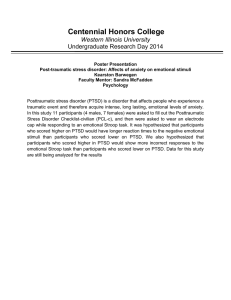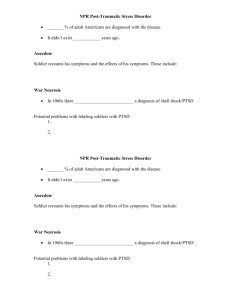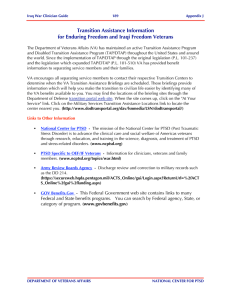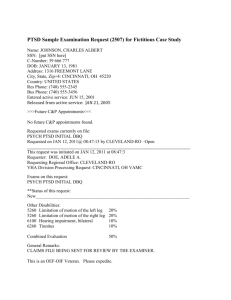Running head: SOLDIERS WITH PTSD: HOW DOES IT AFFECT THEIR 1
advertisement
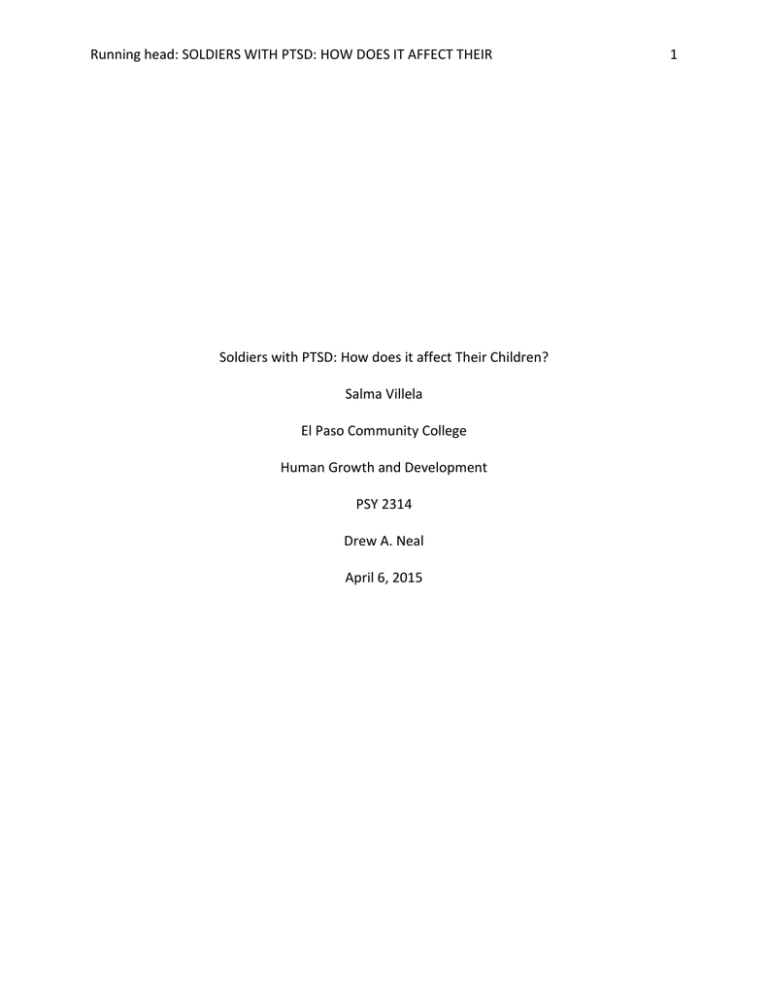
Running head: SOLDIERS WITH PTSD: HOW DOES IT AFFECT THEIR Soldiers with PTSD: How does it affect Their Children? Salma Villela El Paso Community College Human Growth and Development PSY 2314 Drew A. Neal April 6, 2015 1 SOLDIERS WITH PTSD: HOW DOES IT AFFECT THEIR 2 Abstract Soldiers who have returned recently from Iraq and Afghanistan have been increasingly diagnosed with Post-Traumatic Stress Disorder. This paper discusses research focusing on PTSD parents and how their issues with anxiety, depression, and lack of sleep affect their relationships with their children. These symptoms seem to become symptoms their kids develop as well. Not enough research currently exits addressing to what extent parents with PTSD have caused their children to exhibit similar symptoms and problems that these soldiers suffer through. This paper concludes with a recommendation for further research towards investigating this issue in order to identify the problems and offer appropriate help to these soldiers and their families. SOLDIERS WITH PTSD: HOW DOES IT AFFECT THEIR 3 Soldiers with PTSD: How does it affect Their Children? From one day to the next we receive soldiers back into our country from Operation Enduring Freedom and Operation Iraqi Freedom. They come home ready to continue their lives as usual. However, little do they know that once they come back, approximately 45 percent of those soldiers will suffer from what is known as Post-Traumatic Stress Disorder (PTSD). Many returning soldiers, while somewhat aware of PTSD, do not fully understand various symptoms of PTSD. Equally important, the soldiers do not understand how others may react to the changes in personality and behaviors they will exhibit after their return. PTSD sufferers are basically on edge. Symptoms include hearing noises, staying home for a long time and then become surprised by the realization of staying at home the whole time. Most have nightmares, some of those experience nightmares every night. All become depressed to some degree, they have difficulty with sleeping, anxiety, and of course having a hard time relating with others. By definition, PTSD is defined as mental health condition caused by a history of exposure to a traumatic event that meets specific stipulations and symptoms listed in American Psychiatric Association Diagnostic and Statistical Manuel 5 (DSM 5). Those with PTSD experience symptoms from each of four symptom clusters listed in the DSM 5. They are: intrusion, avoidance, negative alterations in cognitions and mood, and alterations in arousal and reactivity (American Psychiatric Association [APA], 2013). Research needs to be conducted which focuses on the effects on children where at least one of their parents has PTSD. Historically, elected officials have recognized the need to study the effects upon soldiers and their families after the veterans have returned home. An example is after the Vietnam War, Congress mandated a group of professionals to investigate what was the impact on children of PTSD veteran mothers, by evaluating PTSD symptoms, their severity and the effects upon SOLDIERS WITH PTSD: HOW DOES IT AFFECT THEIR 4 family adjustment. The study was called the National Vietnam Veterans Readjustment Study (NVVRS) (Gold et al., 2007). Throughout their research, the authors found that women who have PTSD will have an impact in their family and especially upon their kids. This research assessed families by using five self-report items especially designed to target different aspects of parenting, with the key point being the child/parent relationship. The five self-report items were measured from the veteran’s perspective. The items measured to what extent did the veteran’s child cause her problems, how content was she with her kid, how efficient she felt in her role as a parent, and how much she enjoyed her role as a parent. Part of this analysis also covered the aggressiveness of the veteran who has PTSD. Surprisingly, frequency of abusive behavior was greater in the collateral partner, according to what the child victims reported. The child questionnaires measured aggressiveness on a seven-point scale ranging from 0 to 6, with 0 meaning never to 6 meaning more than 20 times. The aggressiveness by the collateral parent included not only physically abuse, but mental abusive as well. The most common reported feelings that the children experienced, mirrored what the veteran’s herself was feeling. These included anxiety, poor self-esteem, lack of sleep, helplessness, depression, hopelessness, and dread. This study proved that parents with PTSD do affect their children, with the most prominent problem being experienced was anxiety (Gold et al., 2007). Soldiers who are war veterans are exposed to a variety of harmful and traumatic experiences in which a nonmilitary person would never be exposed unless they happened to be a first responder in a mass casualty event. Anxiety is one of the main qualities of Post-Traumatic Stress Disorder; anxiety implies the “empty” mood. Referencing DSM 5 again, there are several types of anxiety: panic disorder, social anxiety disorder, specific phobias, and generalized anxiety disorder (APA, 2013). Panic disorder is the feeling of terror that strikes suddenly and in SOLDIERS WITH PTSD: HOW DOES IT AFFECT THEIR 5 repeatedly occasions. Social anxiety disorder is also knowns as the social phobia it includes the feeling of overwhelming worry and self-conscious on everyday social situation; you are always aware of the actions of other, you are always stealthy. Specific phobias, are more likely to cause an anxiety attack. Specific phobias involve the immense fear of an object or situation, resulting in high anxiety and panic attacks. Lastly, we have the generalized anxiety disorder, which concerns an unbelievable worry and tension even if there is no known specific reason provoking anxiety. Anxiety affects the kids in a way that due to their young age they act like sponges and absorb everything they see and everything they hear. Therefore if the parent tends to be afraid of something, is more likely that the kid will become afraid of the same object and/or situation (Capaldi, Guerrero, & Killgore, 2011). There are various different types of depressions identified in DSM 5 (APA, 2013), however only few are experienced through PTSD. DSM 5 describes depression as existing in ten different forms starting with major depression, persistent depressive disorder, bipolar disorder, seasonal affective disorder, psychotic depression, postpartum depression, premenstrual dysphoric disorder, “situational” depression, and atypical depression (APA, 2013). From these ten categories there are only four that are consistent with PTSD. Included is major depression, which usually happens twice in a life time for non-war veterans. However for a war exposed veteran with PTSD, it can occur frequently (Lambert, Holzer, & Hasbun, 2014). Major depression involves the unwillingness to work, eat, study, and even sleep in other words the lack of enthusiasm to live life. The next type of depression is called bipolar disorder or also known as manic-depression. In bipolar disorder the sufferer experiences manic phases where they are extremely happy and content, to a depressive phases where they experience sadness, low energy, suicidal thoughts and even severe depression. The symptoms are in essence the same as a SOLDIERS WITH PTSD: HOW DOES IT AFFECT THEIR 6 traditional depressed person. Another type of depression experienced by PTSD sufferers is persistent depressive disorder, or PDD (formal name dysthymia.) This depression is characterized by a combination of both major depression and bipolar disorder, it implicates the loss of appetite, overheating, insomnia, or oversleeping, stress, irritability, and the lack of satisfaction with what is done or with the people surrounding the one being affected with the disorder. Depressions not only affect the sufferer, but without a doubt those close to the sufferer as well. PTSD veterans who suffer from depression tend to be unsatisfied with their roles, with what they do, with what others do, and even say. Kids tend to be active the whole day up until they go to sleep. This is part of normal maturation, which will be affected by being around parents who are depressed. These kids tend to repress of what they are feeling, what they want to do, and what they want to learn (Lambert et al., 2014). Someone who suffers from depression in this particular case (with the PTSD disorder) tends to avoid situations which tend to lead to irritability. This often means they restrain from activities with the kids, to not be around them reinforcing good behaviors and correcting bad behaviors, and this inevitably creates a more distant parent-son or parent-daughter relationship (Troyanskaya et al., 2015) Lastly, will be a discussion of one of the most common symptoms faced by those who suffer from Post-Traumatic Stress Disorder, which is lack of sleep. Approximately 30 percent of returning combat veterans from Iraq and Afghanistan complain of sleep disturbance even few months after they arrival (www.cs.amedd.army.mil, 20??). This percentage rises if these veterans have head injuries (it raises up to 58.3 percent.) Documentation of war veterans has shown that sleep problems may get worst as time passes; rates may increase up to 90 percent or more. Sleeping disorders not only includes the inability to sleep, but it also includes nightmares, insomnia, movement disorders, sleep terrors, nocturnal anxieties attacks, and of course sleep SOLDIERS WITH PTSD: HOW DOES IT AFFECT THEIR 7 avoidance. In addition, research has corroborated that sleep problem severity is related to the severity of PTSD (Capaldi et al., 2011). In conclusion, throughout the research referenced, the evidence supports the conclusion that PTSD in parents affect parent/child relationships. However, very little research has been conducted and reported which documents how PTSD directly affect soldiers’ children upon returning home from combat tours. The available research has shown that parents are unpleased with their role of being a “parent”, that generally parents with PTSD are unsatisfied with what they do and their loved ones. These parents often become depressed and suffer from anxiety which does affect their family members. The research does indicate PTSD is as hard on the ones who suffer from it as it is for those who are their family members. SOLDIERS WITH PTSD: HOW DOES IT AFFECT THEIR 8 References American Psychiatric Association. (2013). Diagnostic and statistical manual of mental disorders (5th ed.). Washington, DC: Author Capaldi, V. F., Guerrero, M. L., & Killgore, W. D. (2011). Sleep disruptions among returning combat veterans from Iraq and Afghanistan. Military Medicine, 176, 879-888. Retrieved from http://eds.b.ebscohost.com.vlib.excelsior.edu/eds/resultsadvanced?sid=e39f5839438d-409a-b851-892337967862%40sessionmgr114&vid=2&hid=103&bquery=(Capaldi) +AND+(PTSD)&bdata=JmNsaTA9RlQmY2x2MD1ZJnR5cGU9MSZzaXRlPWVkcy1saXZlJn Njb3BlPXNpdGU%3d Gold, J. I., Taft, C. T., Keehn, M. G., King, D. W., King, L. A., & Samper, R. A. (2007). PTSD symptom severity and family adjustment among female Vietnam veterans. Military Psychology, 19(2), 71-81. Retrieved from http://eds.b.ebscohost.com.vlib.excelsior.edu /eds/resultsadvanced?sid=e39f5839-438d-409a-b851-892337967862%40sessionmgr 114&vid=2&hid=103&bquery=(Capaldi)+AND+(PTSD)&bdata=JmNsaTA9RlQmY2x2MD1Z JnR5cGU9MSZzaXRlPWVkcy1saXZlJnNjb3BlPXNpdGU%3d Lambert, J. E., Holzer, J., & Hasbun, A. (2014). Association between parents’ PTSD severity and children’s psychological distress: A meta-analysis. Journal of Traumatic Stress, 27, 9-17. http://dx.doi.org/10.1002/jts.21891 Troyanskaya, M., Pastorek, N. J., Scheibel, R. S., Petersen, N. J., McCulloch, K., Wide, E. A., ... Levin, H. S. (2015). Combat exposure, PTSD symptoms, and cognition following blastrelated traumatic brain injury in OEF/OIF/OND service members and veterans. Military Medicine, 180, 285-288. Retrieved from http://eds.b.ebscohost.com.vlib.excelsior. SOLDIERS WITH PTSD: HOW DOES IT AFFECT THEIR edu/eds/resultsadvanced?sid=e39f5839-438d-409a-b851-892337967862%40 sessionmgr114&vid=2&hid=103&bquery=(Capaldi)+AND+(PTSD)&bdata=JmNs aTA9RlQmY2x2MD1ZJnR5cGU9MSZzaXRlPWVkcy1saXZlJnNjb3BlPXNpdGU%3d www.cs.amedd.army.mil. (2014). http://www.cs.amedd.army.mil/Portlet.aspx?ID=6fe636007daf-4834-9efc-0325f0a01667 9
